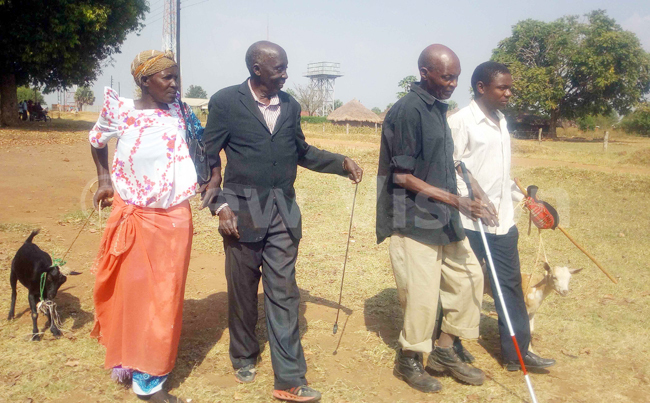Blind people in Teso get white canes
White canes and goats worth sh10m have been given to the district executive leaders of the blind persons to empower to them.
PIC: Teddy Odongo assembling one of the white canes given to the blind persons in Kaberamaido
TESO - The Uganda National Association of the Blind (UNAB) has given 100 white canes to the blind persons in Teso sub-region and Amolatar district to aid their day-to-day movements.
The UNAB programme officer, Teddy Odongo, said their survey had showed that most of the blind persons in the region were not having the white canes.
White canes and goats worth sh10m have been given to the district executive leaders of the blind persons to empower to them.
She said, whereas there were many categories of persons with disabilities in the country, this group was neglected.
Odongo said they preferred to start with the leaders so that they can command respect.
"UNAB has given you this support to make you be able to speak to other blind persons with confidence," Odongo said.
The districts that received the support under this programme include Katakwi, Amuria, Kumi, Kaberamaido and Amolatar.
Odongo said since most of the non-governmental organisations (NGOs) were phasing out, they were preparing the blind people to become beneficiaries of government programmes in their areas.
The chairperson of the association of the blind people in Kaberamaido district, Emmanuel Aanu, decried the suffering they were going through as the communities were not minding about their welfare.
Aanu said they were going to the blind people so that every one of them can partake of the services meant for them.
"As blind people, we have so many challenges. Our caretakers cannot be with us all the time as they have to make ends meet. We are usually left at homes to suffer," Aanu said.

Hellen Alayo leading her-husband, Mathew Elweu as another blind person is also being taught how to use a white cane
He said it was worse for those with multiple disabilities.
"Those of us who are blind and have physical disabilities are left at home, but anything can be stolen when we are at there, since we are more vulnerable," Aanu said.
He said most of them cannot hold any offices since they are regarded incapable.
"The community does not trust us with offices. There are some positions that we are not given since we cannot compete for them with those with vision. The best we can become are advisers," Aanu said.
With the district having one school for the blind, where parents are required to contribute towards the welfare of their children, many end up dropping out.
Odongo said it was annoying that they opened up a primary school for the blind, but they dropped out school.
She said Lwala Girls' Primary School had enrolled 24 blind children for free education, but by the end of 2017, only two children had remained in the school.
One of the teachers from in the school, George Ebitu, said the families failed to provide food for their children at school due to the famine that hit the district.
However, Ebitu said they were willing to re-admit them if their parents can support them.
Kevin Ameso, a visually impaired woman from Ochero sub-county in Kaberamaido district, said she could not move to the market or even to the church.
"Whenever my caretaker wants to take me for prayers; we usually reach late since my speed is poor. This has made my caretaker to abandon taking me for prayers," Ameso says.
A couple with one of them blind was planning to wed in the Church at end of the month of January, 2018.
The male district councillor of Kaberamaido, Simon Ekwanyu vowed to fight for persons with disabilities in the district.
He said he had ensured that every sub-county benefits from the grant for the persons with disabilities given by the central government.
"With support from UNAB, the visually impaired people should be able to advocate for themselves," Ekwanyu said.